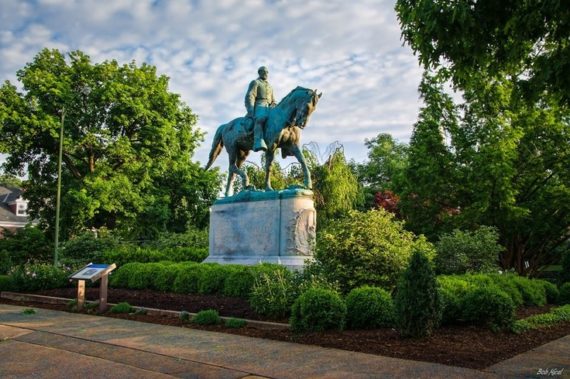Most modern historians reject any suggestion that the South fought the Civil War over states’ rights. They insist that the only states’ rights the South cared about, “as neo-confederates are loath to admit,” was slavery. (According to Wikipedia, “neo-confederate is a term that describes the views of [those] who use [illegitimate] historical revisionism* to portray the [Confederacy] and its actions in the Civil War in a positive light.”) Thus, they conclude, slavery was the solitary cause of the war. They ignore evidence like the South’s persistent objections to federal public works spending, which antebellum Southerners regarded as a responsibility of the individual states and therefore a counterpart to states’ rights. But that’s another story.
When pressed to admit that Southern secession need not have led to war because the North could have allowed the South to leave in peace, today’s historians often assert that the North chose to fight the war in order to “preserve the Union.” Yet if it is necessary to rhetorically ask, “Why did the South want to defend states’ rights?” it is equally proper to ask, “Why did the North want to preserve the Union?” Probing the second question reveals that “preserving the Union” was all about perpetuating Northern economic hegemony, which Pious Cause Mythologists** are loath to admit.
As a leading spokesman for “preserve the Union” mythology, even Professor Gary Gallagher admits that his students “are reluctant to believe that anyone would risk life or fortune for something as abstract as ‘the Union.’” The reluctance of his students is well founded and demonstrates the ancient wisdom that “common sense is not so common”— especially among leaders dedicated to promoting a dubious agenda.
In reality, “preserving the Union” was a euphemistic slogan for avoiding the consequence of disunion, which are grounded in economics.
A surviving independent Confederacy would undoubtedly employ much lower tariffs than the United States. In his inaugural address President Jefferson Davis stated, “Our policy is peace, and the freest trade our necessities will permit. It is . . . [in] our interest, and that of [our trading partners], that there should be the fewest practicable restrictions upon interchange of commodities.” Similarly Confederate Secretary of State Judah Benjamin later offered France a special tariff exemption “for a certain defined period” in exchange for diplomatic recognition.
A low Confederate tariff would present the remaining states of a truncated Union with two consequences. First, the federal government would lose a large part of its tax revenue. Articles imported into the Confederacy from Europe would divert tariff revenue from the North to the South. Second, given the Confederacy’s lower tariffs its residents would likely buy more manufactured goods from Europe rather than from the Northern states where prices were inflated by protective tariffs.
Northerners quickly realized that such concerns were not mere abstractions. In March 1861 New Yorkers were panicked to read a dispatch from St. Louis in a Manhattan newspaper: “Every day . . . our importers are receiving, by way of New Orleans very considerable quantities of goods, duty free . . . If this thing is to become permanent, there will be an entire revolution in the course of trade and New York will suffer terribly.” Cincinnati also reported that goods were arriving from New Orleans tariff-free. Three months earlier the Philadelphia Press editorialized, “It is the enforcement of the revenue laws, not the coercion of [South Carolina] that is the question of the hour. If those laws cannot be enforced, the Union is clearly gone.” Historian Charles Adams explains:
If trade were to shift to the Southern ports because of a free trade zone, or extremely low duties relative to the North, then [the] great cities [of the Northeast] would go into decline and suffer economic disaster. The image painted by these editorials [from newspapers of Northeastern cities] is one of massive unemployment, the closing of factories and businesses, followed by unrest, riots, and possibly revolution. The inland cities of the North would also go into decline, like Pittsburgh, where duty-free British steel and iron products would cripple the American steel industry.
After the opening shots at Fort Sumter many Northern capitalists reasoned that a war would be good for business. Wall Street regarded disunion as a menace to their investments. Government bond quotations dipped with every incident of federal indecision. But given a war the demand for war goods was correctly expected to lift the economy. Since hostilities would block much of the Mississippi River trade, eastern merchants concluded that they could monopolize commerce with the Midwest. Manufacturers would get many profitable military supply contracts. The Midwestern states would supply Union armies with provender.
Such conclusions proved to be valid. From 1860 to 1865, the gross national product increased from $4.3 billion to $9.9 billion, which translates to an 18 percent compounded annual growth rate. Since the economy in the South was shrinking, the rate applicable to the Northern states was probably well above 20 percent annually.
As Woodward and Bernstein famously put it in another context a century later, “follow the money” to discover the truth.
===
*The Wikipedia defines “historical revisionism” as “an illegitimate distortion of the historical record.”
** “Pious Cause Mythology” is historical revisionism based upon the Evil Twin metaphor. It metaphorically interprets the Civil War and Reconstruction as a contest between twins in which the North is the “good” twin and the South is the “evil” twin.







